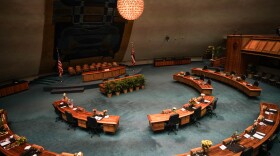Some of Hawai?i’s doctors are struggling with the latest changes in the way they are paid by the Hawaii Medical Service Association, the state’s largest health care insurer. Two years ago, HMSA altered the way it compensates physicians, all in a bid to control rising costs and improve care. But the transition has been tough on some independent primary care doctors.
When Dr. Melanie Payanal opened her practice in Aiea four years ago, she knew it would be a challenge but she didn’t realize she’d need multiple jobs to keep her doors open.
“I’m realizing that I’m not making it,” says Payanal. “And I’m realizing that in Payment Transformation, it doesn’t work across the board for all primary care providers.”
Payment Transformation is HMSA’s effort to reduce medical expenses by capping the amount it gives primary care doctors for each patient. The program is part of a national movement to align health care costs with value instead of volume.
Doctors get an average payment of $24 per patient each month. The more patients a doctor has, the more money he or she gets.
Payanal said it’s good for medical practices with 1,500 or 2,000 patients. “But if you’re starting out with 639 patients, it’s really difficult for you to make ends meet,” she said.
Other doctors are encouraged by the move away from conventional reimbursements to the pre-paid method.
“By not making them do certain things in order to get paid -- instead just say, 'Hey, here’s some money go figure out what is the best thing' -- that’s really liberating,” says Dr. Gerard Livaudias, vice president of Hawai?i Health Partners, the not-for-profit health care system that includes hospitals like Kapiolani Medical Center for Women and Children and Straub Medical Center.
Livaudias said the transition has been pretty good for the 150 or so primary care doctors with Hawai?i Health Partners.
“They are no longer requiring everyone to come in for a visit when they can do something by an email,” said Livaudias. “And we can actually see it in the data, because the number of visits in primary care are starting to decline down a little bit.”
Fewer visits mean lower costs, and if doctors cut costs, they can keep more of the HMSA payments. But doctors must also prove they’ve used the dollars to meet quality care goals, which can be time-consuming.
“There’s too much [of an] administrative burden, and the pay that we’re getting is too low for what’s being expected,” said Hilo primary care doctor Michelle Mitchell.
She left the Payment Transformation program after participating in a nine-month pilot project. She says she's worried the new system is driving doctors away.
“Some physicians went to a direct primary care practice instead of closing, some physicians closed, some moved to the Mainland and some like me went back to fee-for-service,” said Mitchell.
Dr. Kelley Withy, who oversees the annual physician workforce assessment, said there’s no data to prove that doctors are leaving the state because of the new payment system. But she says Hawai?i’s doctor shortage is approaching 800 – with a third of that for primary care physicians -- and the scarcity is growing.
“We definitely don’t want that to happen,” said Dr. Mark Mugiishi, HMSA’s chief medical officer.
Mugiishi said nearly all of HMSA’s primary care doctors are on Payment Transformation. They care for around 450,000 patients.
“Change is always hard and much of the change in this particular program is put on the shoulders of the physicians and their staff,” said Mugiishi.
He said HMSA is working to alleviate the administrative burden. The good news, he said, is data from the program’s first year shows improved access, quality of care, and patient satisfaction. But as far as reduced costs, he said it’s too early to tell.
“We think over time, this will become more and more a cost savings that can be passed on to the consumers,” he said.
In the meantime, Payanal isn’t sure how much more risk her small practice can bear for a system that has yet to prove itself.




